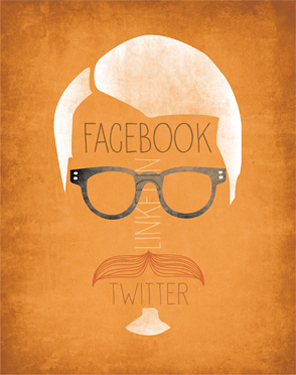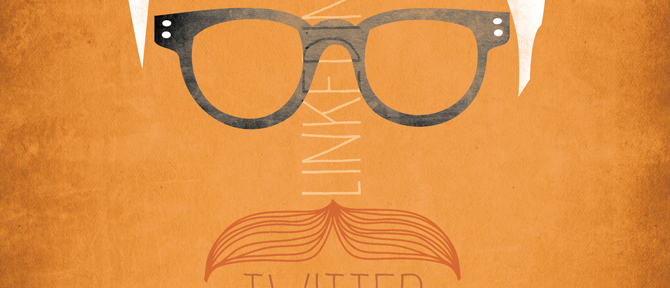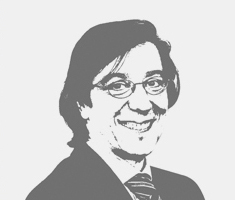Should we reinvent ourselves on the Internet?
It happens without warning. One day, you find out that the President of a well-known company has given his opinion about an important issue on Twitter. When you visit the website you quickly observe that his profile is credible. Then, you read a few statements. Everything fits in with his personality: how it is written, the tone and the issues addressed. It seems plausible that the statement has been written by him.
At the same time, your inbox is full with invitations to connect on LinkedIn, invitations of acquaintances or professionals that have created profiles and that have sent messages to all their contacts. Actually, you only want to maintain, when not to reduce, your relations. When I think about all the unfinished work I have yet to complete, it is clear to me that the last thing I need is to lose my time with these things. Maybe at any other time of your career, you thought about expanding your relational universe. Nevertheless, in this particular case, you do not think the effort would be worthwhile, especially through a curriculum in a website.
The tablet and the mobile have become a window through which you risk your personal and professional credibility
The insistence or the status of someone leads you to visit his site-CV. Then you verify that the description is very comprehensive. You pay attention to the picture, relatively new, to the number of contacts and to his new job (of which you knew nothing about). Maybe it is time to update your CV.
You decide to talk about it with your friends and colleagues, and you realize that the others ask themselves the same questions, or have the same reservations. There are passionate supporters and easily scared critics to cope with the transparency of the networks. But what it seems clear is that recently, and almost without us realizing it, these networks and their communication tools have changed the rules of the game. The tablet and the mobile have become a window you cannot or should not close, and which allows the entry of news, invitations, announcements or the multitude of messages that jumble your private and public spheres. It is a window through which you also present yourself to the world, and through which you risk your personal and professional credibility.
However, while some seem to manage quickly this complex reality and have adequate and consistent data, messages, descriptions and pictures; others are not aware of their importance so they keep poor quality pictures, outdated information, strange scenarios, inadequate poses… Eventually, a public description of themselves that does not represent them and, on many occasions, does a disservice.
In the middle of this tectonic movement, the firms are the ones that begin to exceed the heads, the hosts the show
TIME FOR A CHANGE
We are conscious that we have to address these changes but we have to figure out how and when we do it.
For the professionals of communication and marketing to solve these unknowns can become a distinguishing and strategic factor, or a serious headache. We are living in difficult times. On the one hand, citizens have withdrawn their confidence from most of our institutions, to the extent that employees themselves have greatly exceeded the first executives in terms of credibility about…the companies they run!
At the same time, the print and audiovisual media suffer a restructuring of huge dimensions. The lack of solvent business models makes them face an unprecedented situation in which they feel obliged to reduce staffs and formats and to question the use of the actual raw material of their profession: information. In the middle of this tectonic movement, the firms are the ones that begin to exceed the heads, the hosts exceed the show. A model that gives back prominence to the individual and that coexists much better with the direct conversational essence, one-to-one, of the website.
On this basis, the companies that we want to position our messages in the adequate forums realize that we must manage a different process, radically new, which is extremely important with a huge importance for our profession. Over more than one hundred years, the dynamic was to place the brand before the people. Very few professionals were authorized to talk and were doing so mostly from the corporate view of the spokesperson: monotonous, trained on dialogue, asynchronous, concise and low profile.
THE POWER OF PROFESSIONALS
 Nowadays, we do not have the means to call together an audience in a single act; with the credibility of the figure of the corporate spokesperson weakened and, today more than ever, with the need to compete on the new markets in which, at the beginning, we do not have the knowledge or the confidence of those who can have an influence in our business. We have in front of us a strange but powerful lever: the prestige of our professionals, their capacity of influence and the capillarity and appropriateness of their significance. The sum of their digital identities is shown as a mechanism of propagation and membership with a rather considerable impact.
Nowadays, we do not have the means to call together an audience in a single act; with the credibility of the figure of the corporate spokesperson weakened and, today more than ever, with the need to compete on the new markets in which, at the beginning, we do not have the knowledge or the confidence of those who can have an influence in our business. We have in front of us a strange but powerful lever: the prestige of our professionals, their capacity of influence and the capillarity and appropriateness of their significance. The sum of their digital identities is shown as a mechanism of propagation and membership with a rather considerable impact.
As a result, it is time to face that inertia that still distance our colleagues, friends and us from the digital platforms. We need to take the first step to lose the logic fear to what is new and convince ourselves of the superficiality of many alarmist myths that go around the networks. Secondly, we need to inspire others, pull their obsession with control and lead the way towards spontaneity, moderation and common sense. There is a whole world of difference between “nobody moves without our permission” and “dare to participate and be yourselves”.
At the same time, we have to identify and decide on issues that will mark our digital personality. The two most important are: how personal or professional will our identity on the Internet be? How official or unofficial our communication model would be?
For us, the global companies, all that remains is to place people of our organization, into the centre of our communication strategy, and to do it in a “social” environment
On the one hand, we have co-workers that can be leaders of a specific community, and share contents about an important matter for our organization, but do not want to be identified with the tone and the corporate messages. They want to preserve their style of communication. Probably, most of the confidence and respect the members of that community have placed in them, depends on encouraging and respecting this decision.
On the other hand, we have leaders in our business lines that, in spite of being thoroughly identified with the company, they simply share personal information. As a result, they call together an audience essentially formed by friends and relatives without the slightest business significance.
Both positions respond to different ways of combining these factors, and to different levels regarding how they manage their identities. Their choice determines, ultimately, how the communication can add more or less value to the business strategy.
It is a path we have to travel along. By doing so, we will live up to our achievements in other areas. It will encourage a deeper connection with the environment and compel us to be updated. It will differentiate us, because it will allow us to tell a multiple, more truthful, dynamic and exciting story. And above all, it will allow us to share it knowing that others share it too.
As all the challenges we face as ambitious organizations, it will consume resources, it will take time, it will lead us to some dead-ends, sometimes it will mislead us and disappoint us, although we will learn of our mistakes. However, for us, the global companies, internationalized, innovative and with a growing diversification, all that remains, is to place the people of our organization, with their personal and professional identities, into the centre of our communication strategy, and to do it in a “social” environment that is not a forward looking perspective, but an increasing deep-rooted reality.

